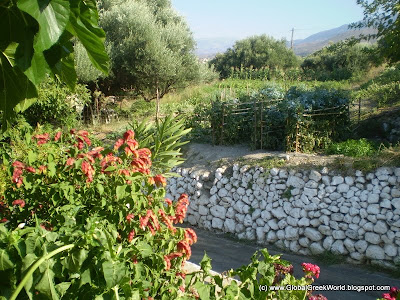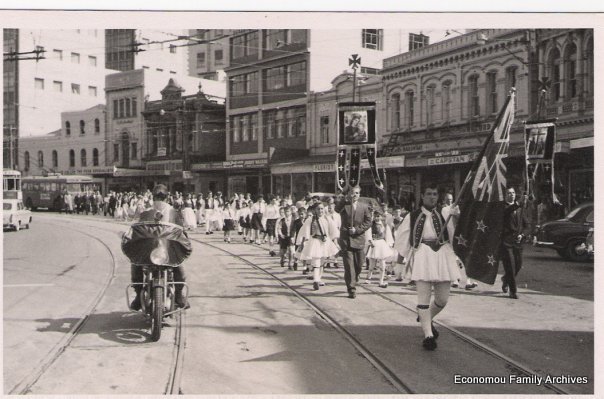St George Lykavettos
23rd April is a very important day in Greece's calendar, St George's Day, the nameday for all the Georges and Georgias, traditionally a very popular name in Greece, including that of the Prime Minister, George Papandreou.
What this means is that 50% of the population is probably celebrating a nameday today somewhere in our Global Greek World!
Our family is no exception, with my beloved George leading the list of those celebrating, we have at least 10 family members celebrating today! Na sas xairomaste olous!
It is a nameday that changes depending on when Easter is celebrated... if Easter falls after the 23rd April, it is celebrated on the Monday after Easter Sunday, if Easter falls before the 23rd April, as was the case this year, then it is celebrated on the day itself.
This year it is also the day Greece officially applied to the IMF and the EU for assistance to solve the economic crisis, but for the moment we won't dwell on it...
For the moment we dedicate these beautiful songs to all our Georges and Georgias, and wish each and everyone of you a very happy Nameday.
Xronia Polla kai Kala! Enjoy!
Xronia Polla kai Kala! Enjoy!
Γιώργο και Γεωργία, Χρόνια Πολλά και Καλά!!
About Saint George
Saint George was born to a Christian noble family in Lydda, Palestine during the late third century between about 275 AD and 285 AD, and he died in Nicomedia. His father, Gerontius, was a Roman army official from Cappadocia and his mother was from Palestine. They were both Christians and from noble families of Anici, so by this the child was raised with Christian beliefs. They decided to call him Geōrgios , meaning "worker of the land". At the age of 14, George lost his father; a few years later, George's mother, Polychronia, died. Eastern accounts give the names of his parents as Anastasius and Theobaste.
Then George decided to go to Nicomedia, the imperial city of that time, and present himself to Emperor Diocletian to apply for a career as a soldier. Diocletian welcomed him with open arms, as he had known his father, Gerontius — one of his finest soldiers. By his late 20s, George was promoted to the rank of Tribunus and stationed as an imperial guard of the Emperor at Nicomedia.
In the year AD 302, Diocletian (influenced by Galerius) issued an edict that every Christian soldier in the army should be arrested and every other soldier should offer a sacrifice to the Pagan gods. But George objected and with the courage of his faith approached the Emperor and ruler. Diocletian was upset, not wanting to lose his best Tribune and the son of his best official, Gerontius. George loudly renounced the Emperor's edict, and in front of his fellow soldiers and Tribunes he claimed himself to be a Christian and declared his worship of Jesus Christ. Diocletian attempted to convert George, even offering gifts of land, money and slaves if he made a sacrifice to the Pagan gods. The Emperor made many offers, but George never accepted.
Recognizing the futility of his efforts, Diocletian was left with no choice but to have him executed for his refusal. Before the execution George gave his wealth to the poor and prepared himself. After various torture sessions, including laceration on a wheel of swords in which he was resuscitated three times, George was executed by decapitation before Nicomedia's city wall, on April 23, 303. A witness of his suffering convinced Empress Alexandra and Athanasius, a pagan priest, to become Christians as well, and so they joined George in martyrdom.
His body was returned to Lydda for burial, where Christians soon came to honour him as a martyr...
Then George decided to go to Nicomedia, the imperial city of that time, and present himself to Emperor Diocletian to apply for a career as a soldier. Diocletian welcomed him with open arms, as he had known his father, Gerontius — one of his finest soldiers. By his late 20s, George was promoted to the rank of Tribunus and stationed as an imperial guard of the Emperor at Nicomedia.
In the year AD 302, Diocletian (influenced by Galerius) issued an edict that every Christian soldier in the army should be arrested and every other soldier should offer a sacrifice to the Pagan gods. But George objected and with the courage of his faith approached the Emperor and ruler. Diocletian was upset, not wanting to lose his best Tribune and the son of his best official, Gerontius. George loudly renounced the Emperor's edict, and in front of his fellow soldiers and Tribunes he claimed himself to be a Christian and declared his worship of Jesus Christ. Diocletian attempted to convert George, even offering gifts of land, money and slaves if he made a sacrifice to the Pagan gods. The Emperor made many offers, but George never accepted.
Recognizing the futility of his efforts, Diocletian was left with no choice but to have him executed for his refusal. Before the execution George gave his wealth to the poor and prepared himself. After various torture sessions, including laceration on a wheel of swords in which he was resuscitated three times, George was executed by decapitation before Nicomedia's city wall, on April 23, 303. A witness of his suffering convinced Empress Alexandra and Athanasius, a pagan priest, to become Christians as well, and so they joined George in martyrdom.
His body was returned to Lydda for burial, where Christians soon came to honour him as a martyr...
Read More at Wikipedia








































